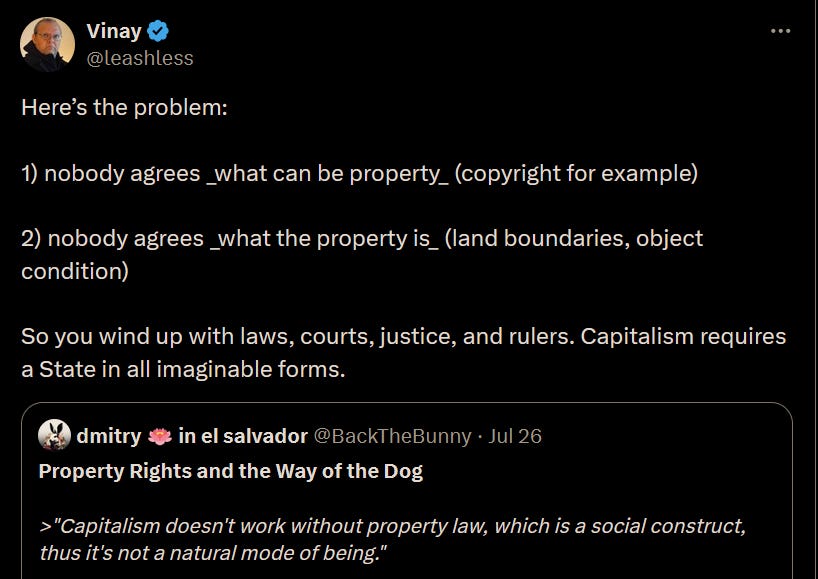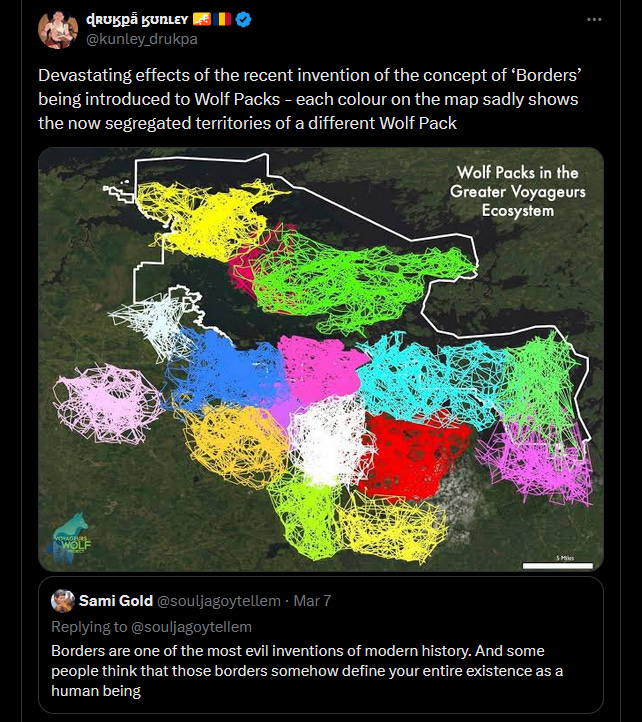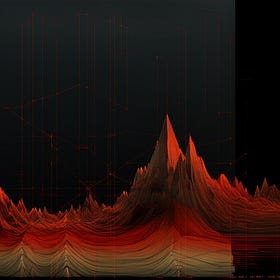Property Rights, Toilets, and the Way of the Dog
Property of the dog, wasp, wolf, and human are all understood on the same terms. Consider the toilet...
This is Part 2 of a series related to natural law, focusing on capitalism and property. Part 1 covers how “capitalism” is not a man-made construct and is misleadingly named; rather, it’s a recognition of an emergent set of organic behaviors man does naturally, and is more appropriately understood as Human Natural State. This essay will cover where property comes from.
Part 1: Capitalism, Lions, and the Way of the Beaver (linked again at the end, read this essay first)
"Private property didn’t exist before man put pen to paper and concocted laws about it. Capitalism doesn't work without property rights, which are a state-made social construct, thus capitalism is not a natural mode of being. Property comes from the state, ergo capitalism does too.”
- a characterization of the general view of property rights and private property
The above statements are both untrue as to where private property comes from, and are apt proxies for how most people think about it. They consider private property a creation of an intellectual or the state. This is tantamount to claiming that man “created” fire, and the state allows it to burn… did you create it, or discover it? Did you invent it, or recognize it? One is more flattering to your sense of self than the other.
Some examples to illustrate the inversion:
We don't eat because we have farms; we have farms because we eat.
We don't socialize because we have parties; we have parties because we socialize.
We don't go to the bathroom because we have toilets; we have toilets because we go to the bathroom.
We don't conduct business (trade) because of corporations; we have corporations because we conduct business.
We don’t have babies because of cribs; we have cribs because we have babies.
We don’t have property because laws exist; we have laws because property exists.
These things make the natural action they're in service of easier, more efficient, and civilized, but in no way are they responsible for them existing in the first place. They recognize the phenomenon and facilitate it, they do not create it.
Capitalism is an academic designation for the natural state of man, because man seeks capital (resources, food, trade, etc.) as his default state, with no prodding or instruction. Similarly, property is a recognizable concept not only across cultures, but across species. Thus, laws do not create property, property has created the need for laws.
Private property is not a man-made, government construct; it's natural law. It's understanding is innate in mammals, and it can only be breached, and enforced, violently. Pray tell how you think the state imposes its rules?
In Part 1 we considered the Beaver, Lion, and Giraffe. Now we will….
Consider the Dog
Private property is a natural creation; you can test this claim very easily. Go up to the next dog you see with a bone or food, and take it from him.
There is no "property law" protecting the dog's possessions. He has no understanding of any rights, nor do they apply to him. If there was such a law, he’d be oblivious to it. Watch his reaction.
Now go take an item nearby that isn't in his possession. Grab someone else's food. Take a toy out of your kid’s hands. Watch the good boy’s reaction. Does he care? Why does he instinctively protect his possessions? What reaction did your kid have when you took his toy? Is he drawing on legal statutes in his objection to it?
Why does the dog, a simple animal with no government-bestowed property rights, respond in this way?
Consider the wasp.
Next time you see a wasp's nest in a tree, go to another tree nearby and take leaves off the branches. See how the wasps respond.
Now go to the tree with the wasp nest and try to take the nest. You don't have to attack or hit it, just try to take it. Just get near it even.
If you're comfortable with how natural law applies in these situations, you don't need to run these tests. Despite there being no peer-reviewed study to point to, you understand what will happen, and why it will happen. This is what Natural Law is. Rules man does not create, but that he must recognize; they exist regardless if he agrees with them. You violate them at your own risk.
If you're of the "umm source?" variety that thinks "my textbook says capitalism is a system of capital and private claims to profits and property, I don't see how this applies to animals and private property"... you should run these property-rights studies. Have a peer nearby so we can make sure they're reviewed.
Shall we consider the tigress and the zebra she's captured? How about a crow and the shiny objects he collects? Ever seen a cat get jealous and possessive of something? All of these animals clearly have read Adam Smith.
How about we consider the Iraqi? Or the Somalian? Those guys have like zero state-backed property rights, and they're human. Go run the study of "take something in the possession of a Haitian who doesn’t have state-sanctioned property rights" and report back.
Just as animals do, humans instinctively recognize and defend private property. Because they'll either attack you if you take their property and they have sufficient violence capacity to get it back, or they'll begrudgingly submit to your theft if they're too violence-constrained to resist. What determines private property in every single instance imaginable? Force. State, or no state.
It may be disturbing to reflect on what’s actually limiting your child and dog from taking back what they believe is theirs… better to not think about it. Your cat would probably eat you if you were small enough.
If it's a phenomenon that exists across cultures and species, it is INNATE, it is NOT a social construct, and it is natural law, not the law of some government.
Noble governments have laws that align with natural law, they don't get credit for something nature imposes. A competent state recognizes nature’s dictates, it does not create them.
Who Decides What’s Property? Consider the Wolf.
This rejoinder of "Well who’s to say what’s property exactly? Guess it comes from the government!" is taking fuzzy issues at the periphery and acting like what constitutes the center isn't apparent. It's a fallacy of composition, you take the fringe case, then paint the entire issue as if it were the fringe.
But fine, let's talk edge cases. How are these nuanced instances determined? If we didn't have lawyers or a government, would there be no answer?
Instead of the tedious task of addressing each "well what about THIS edge case hmm?", let’s zoom out and batch-answer it all at once. How do animals figure it out? Is it any different from how we do it?
Consider how the wolf would solve the land-boundary question.
It's very simple how the wolf figures out his borders: he defends it, violently. If he can maintain his territory as he defines it, it's his. If you can keep something, it belongs to you. Property is always what violence decides is yours, or someone else’s.
Pretending this is a "legal" question for humans is just adding a comforting, deluding layer of abstraction over what actually informs these decisions. You are an animal just like the wolf, even if you're indignant about it. You determine it the same as the wolf, with a soft verbal overlay that distracts from how all property is ultimately determined.
“How is it the same as the wolf? We have laws and courts who decide this, not rabid packs of warring animals. Explain yourself.”
Where do the laws that decide these questions come from? Where does a court’s power originate? I’m not asking for the School House Rock academic-textbook answer. I mean how does one even get the authority to decide such things?
Where does the raw ability to deem what is "right" on subjective, contentious questions of ownership stem from? Because there isn't an objective conclusion for who owns abstract, or even concrete things. How is this adjudicated?
Might Makes Right. Might Keeps Property.
The boundaries of what constitutes property are drawn by he who exerts the most might. That’s where the “correct” answer comes from on whether a copyright is enforceable. Or if a border will be upheld. On anything. Violence is not, at all, a state “social construct”; it is however a state monopoly if you have a capable government.
Violence imposes the natural laws of property: for the wolf, dog, wasp, and human. All societal laws enshrining private property are upheld with kinetic energy. All fuzzy boundaries are mediated this way. All claims to resources resolved as such. There is no exception to this. Walk through any scenario, ask yourself what happens if you violate the state’s rule, ponder if the state asks nicely that you stop, or does something about it. Why don’t you do something about it if you disagree? Why is their decision final, and yours isn’t? It’s the case of “the kid who had his toy taken away” all over again.
There is never a law or agreement without physical backing. Deterrence or a “collective understanding” that you think is just peaceful like-minds coexisting with kumbaya vibes is better elucidated as "someone's violence capacity is so overwhelming no one dares challenge their rules", which manifests as peace.
Peace through strength is how a comfortable world works. War is what happens when one’s strength is not overwhelming or apparent enough; for the same reason you don’t challenge Brock Lesnar to a fight if he insults you, but that 5’8” 170lb guy does not strike compliant fear into your heart quite the same way.
Might makes right, because might makes the rules; adherence to the rules determines right and wrong. This is what order is, and the rules of order are imposed via said might. To follow the rules is to be “right”. The decision that aligns with the violence monopolist’s opinions becomes the “correct” answer: for animals, and for humans. All private property, all of it, is settled in this way by every species. Private property, such an academic social construct.
A civilized society is that which understands a property violation produces a violent reprisal from the state. It outsources the violence to the state.
An uncivilized society is that which understands a property violation produces a violent reprisal from an individual, gang, mafia, or whoever has the physical capacity to inflict it. It does not outsource violence to the state.
Scenario:
Hey, you just stole my bike. Give it back. No? Cool, the cops are on their way. Guess what they do? Ask nicely with their words of course...
I live in a place with no law enforcement. You just stole my bike. You know how I get it back? By asking nicely, of course…
You either outsource your violence to the state, or impose it yourself. It’s uncomfortable what makes this all really work. Something is yours if you have the ability to defend it, or the ability to call on someone to defend it for you.
(If you’d like more scenarios on how a law is enforced, you can read this after: Code is Not Law, Men With Guns is Law.)
You can take this to any layer of abstraction you want: burglary, financial fraud, corporate theft, etc., if someone violates your private property and you live in a civilized state, the state takes care of the dirty work for you. You report it, and the men with guns inform them that the item will be going back.
If you live in a less-than-ideal society, like the Haitian or Iraqi, it's incumbent on you or your tribe to take care of business and return what's yours. If you can’t, then it’s no longer yours. The West is still the most ideal place to live, because it has created laws pertaining to contracts and property that best align with natural law, and it most-credibly imposes violent defense of it; which obviates the need for the individual to do so. This is a recognition of the law of the jungle, a streamlining of a carnal process. Nothing about a man with a gun imposing something is a social construct.
The test for private property is: if it can be defended, it can be kept. Do you live in upstate New York? Lawless Somalia? Doesn't matter, your property is still resolved fundamentally the same way. With force. The courts are simply a more dignified, efficient way to mediate this; but the violence backing their decisions is no different from the Somalian’s. Who carries out the court’s ruling as well as the Haitian gang’s? It’s men with guns all the way down. Or wolves with teeth.
Ideally, the state is who does the unpleasant labor of enforcement, because refined people find it unsavory to have warlords or militias impose rules with overt swords. But we know what happens if there is no state violence monopolist: emergent, balkanized violence takes shape, gangs are formed, and someone still ends up owning the property. All the edge cases get ironed out! Because someone always has a claim to property, with or without a law; it all rests on the philosophy of a sword.
Similar to a factory-farm slaughterhouse, it’s best to not think about this while you’re enjoying your steak. But don’t deceive yourself as to where your property rights, or the grocery-store meat, come from. We didn’t create meat and we didn’t create private property; we just found more efficient ways to implement our innate desires for them.
A Good Capitalist Government Is Like a Toilet
Imagine the government abdicated its duties, their courts and men with guns no longer defended what’s yours. *Poof*… you have no more private-property rights. What happens next? You lose all your things? Or do you instinctively not let someone violate your property, even though a group of politicians aren’t there to legislate it. All it means is you can’t outsource your violence anymore. We don’t need to run a test on this one, we can look to history: colonialism, warring Indian tribes, and any instance where there was no state to say “this is yours”, see what humans do to figure out ownership. Wolf coded.
Now imagine if the state decided it would commandeer all its citizens’ property. It suspended all the property rights, and lays claim to everyone’s possessions. In effect, communism. Do you hand everything over because the rules changed? How would the state pull this off? Lawyers obviously! Ha.
It would have to unleash ungodly violence on its population to attain the level of submission necessary to accomplish this. Which is possible. The USSR and North Korea have shown you can. However these regimes didn't use a "social construct" to pull it off; it takes incredibly brutal, oppressive force to deprive people of their property. It requires many, many men with guns, and zero attorneys and academics.
A good “capitalist” government does its best to remove the need for tribal brutality, and has virtuous rules that exalt and defend our natural individual pursuit of capital and property. Prosperity follows suit when we can focus on competence deciding outcomes, not individual violence capabilities. Though keep in mind, coercion is always the official arbiter.
It’s no coincidence capitalist nations are where everyone wants to live. It's because they facilitate, and recognize, the best versions of man's visceral, evolved urges. They maximize desired outcomes with rules built around our divine mammalian instincts. But they are not responsible for those instincts, or nature’s resolution methods.
Toilets definitely make life easier, but we'd all still go to the bathroom without them. A good capitalist government is like a toilet: it makes our natural pursuits a whole lot more comfortable, but that physical urge is still happening either way :)
Subscribes and shares are very much appreciated. If you enjoyed the essay, give it a like.
You can show your appreciation by becoming a paid subscriber, or by donating here: 0x9C828E8EeCe7a339bBe90A44bB096b20a4F1BE2B
I’m building something interesting, visit Salutary.io
Related essays:
Capitalism, Lions, and the Way of the Beaver
Someone asked me the below question. I find the entire premise of it wrong. Not uniquely wrong though. My issue is with the very nature of what we call “capitalism”. Yes, DeFi counts as capitalism, because it’s a form of money, commerce, and trade. Money and financial infrastructure are just tools for commerce and trade. DeFi is a digital paradigm for n…
Astrology, Darwinian Truths, and Biochemistry in the Womb
Lying in bed, she turns to me and says “I don't take the astrology stuff seriously, it's just fun. Don’t judge me.”. I appreciated her overture, we had discussed astrology earlier and she could tell I, like most men, wasn’t exactly into it. I'm used to most women believing in it, so it’s not a big deal. But I felt like trying to meet her halfway…in my …
We'll Give You Things > We'll Leave You Alone
This essay is another prelude to my Biofoundationalism series.














Great article, really like how you frame property with violence and the animal instinct for acquisition. A nit pick, if we reduce property to the behaviour of lower animals such as possession, investment, and defence then how do we makes a distinction between theft and legitimate ownership, as in: did I invest in a possession through productive, predatory, or parasitic means?
For me, this is what distinguishes possession from property and makes property/property rights a uniquely human behaviour with moral, ethical dimensions. This does not position property as an arbitrary social construct, instead it grounds in empirical measures such as suppressing free riding and accruing group capacity for violence/defence via high trust commons.
If a possession is stolen then there is no valid claim to “property” and any group making the error of asserting otherwise undermines their ability to facilitate internal cooperation and generate high agency individuals
Of course, this is semantics on some level, but I do see value in having separate terminology for investments that are merely under possession versus investments that are formally acknowledge and insured by a broader group acknowledging the fact that the investment was obtained by the investor bearing the full costs without any free riding on other members of the group
This is where the NLI’s definitions for property and rule of law come in, or that’s how I see it, anyway
Great article. The other analogy that comes to mind is that you can take the house or clothes of the person arguing against private property. If they react... you made your point.